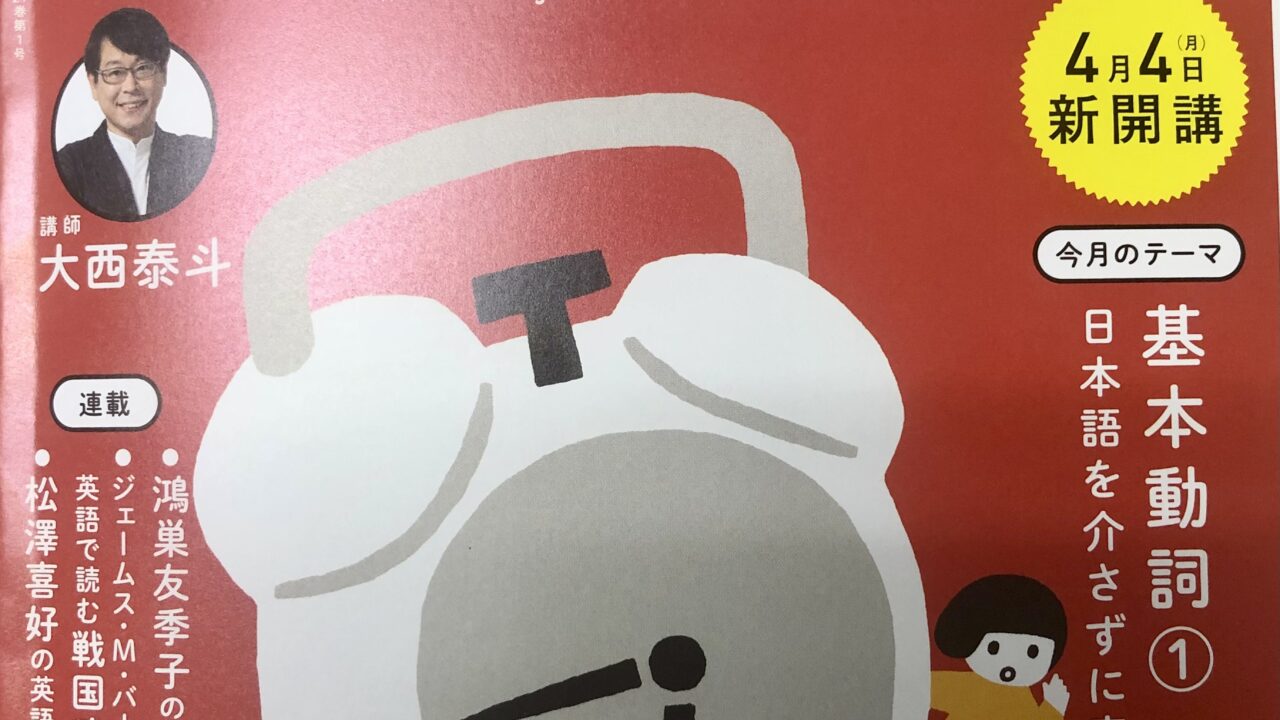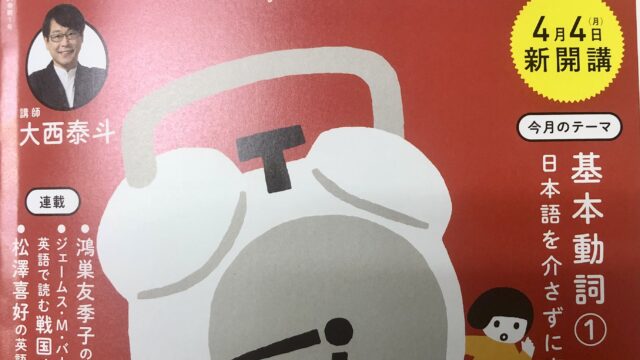【ラジオ英会話】Lesson 16 put でネイティブスピーカーのイメージの広げ方を理解する – April 25 Monday, 2022

April 25 Monday, 2022
Lesson 16 put でネイティブスピーカーのイメージの広げ方を理解する
☆Opening
C: You know what? I’ve decided to quit this program.
R: Really?
C: Roza, you’re not supposed to sound happy about it?
R: Oh, I mean. Really? Oh, that’s too bad.
C: That’s too late. Anyway, guys, I’m just joking.
☆Words & Phrases
**ad:
You’ve been doing a great job on the ads.
**experience:
She has more experience than I do.
**fresh idea:
That’s true, but you have a lot of fresh ideas.
**perspective:
Well, I have a younger perspective on things, maybe.
Exactly.
**in charge of~:
**advertising department:
That’s why I am putting you in charge of the advertising department.
**What about~?:
But what about Yuriko? She is my manager.
**I’m afraid~:
**quit:
I’m afraid she has decided to quit.
☆Grammar & Vocabulary
① You’ve been doing a great job on the ads.
現在完了進行形
・「(今に)迫ってくる」イメージを持つ現在進行形
・出来事を生き生きと描写する進行形
のハイブリッド。
have been + 動詞 -ing形 で
「過去から今に至るまで生き生きとした行為が続く」ことを表す
→「ずっと~している」
② I enjoy working with Yuriko.
リアリティ動詞
「~することを」と動詞句的内容を目的語にするときに、動詞 -ing形しかとることのできない動詞。
リアリティ動詞は具体的な状況が思い起こされる動詞。実際に具体的な状況が起こっていなければ、それを「enjoy = 楽しむ」ことはできない。
そのため「出来事を生き生きと思い浮かべる動詞 -ing形」が使われる。
☆Key Sentence & Feel English
That’s why I am putting you in charge of the advertising department.
put が「何かを・ポン」する場所は、日本語の「置く」よりはるかに多彩。
この文の in charge of~ という「場所」もその一つ。
★ put が何かを置く「場所」の例
① put him in the beginner group
→ group は抽象的な「場所」
② put your life at risk
→ put が置く場所は具体的な場所に限らない。risk は「危険」
③ put Japanese into English / put my feelings into words
→「日本語を英語へ」「感情を言葉に」。into で「変化」を表す
④ put the family first
→ first を使えば、順序も表せる
☆Practice
C: So guys. Are you ready to practice further this verb “put”? Let’s get started.
Basically, it’s a very simple image of “move” and “place.” Move ”whatever” to a place ”whenever. ”
But today we’re gonna focus on the fact that it doesn’t have to be a concrete place, a physical place.
It’s also used for more abstract types of places.
So with that in mind, let’s practice together.
**concrete:
**abstract:
R: And remember! Don’t think in Japanese.
C: So here we go the first one!
☆Expression in Action
①私の上司は、私が会社を第一に考えるべきだと言います。
**company:
②私は彼女を愛しています、でも私の気持ちを言葉にすることができないのです。助けて!
③彼女は上級者グループに入れるに十分なくらい優れています。
**be good enough to~:
**advanced group:
___________________
April 25 Monday, 2022
Lesson 16 put でネイティブスピーカーのイメージの広げ方を理解する
(日本語訳・解説付き)
☆Opening
C: You know what? I’ve decided to quit this program.
R: Really?
C: Roza, you’re not supposed to sound happy about it?
R: Oh, I mean. Really? Oh, that’s too bad.
C: That’s too late. Anyway, guys, I’m just joking.
☆Words & Phrases
**ad: 広告(advertisement)
You’ve been doing a great job on the ads.
(あなたは広告でずっと素晴らしい仕事をしてきました)
**experience: 経験
She has more experience than I do.
(彼女は私よりも経験豊富です=彼女は私が持っているよりもより経験を持っています)
**fresh idea: 斬新な発想
That’s true, but you have a lot of fresh ideas.
(確かにそうなんですが、あなたは斬新なアイディアをたくさん持っています)
※
That’s true, but~
Yes, but~
Yeah, but~
「そうなんですが~」相手の言っていることを一旦引き取ってから押し返す。この流れをつかんで使ってみましょう!
**perspective: 見方、視点
※ perspective の spect は「見る」という意味ですね!
spectacle:
見えるもの → 光景
spectator:
見る人 → 見物人
respect:
〜の後ろを見る → 尊敬する
inspect:
中を見る → 調査する
prospect:
前を見る → 見込み
など。
Well, I have a younger perspective on things, maybe.
(ええと、私はより若い視点を物事において持っています、たぶん=たぶん私は、物事に対して若者からの視点を持っているんだろうと思います)
Exactly.
(まさにその通り)
**in charge of~: ~の担当で、~に責任がある
**advertising department: 宣伝部
That’s why I am putting you in charge of the advertising department.
(それが私があなたを宣伝部の責任者に置く理由なのです)
**What about~?: ~はどうなのですか?、~についてはどうですか?
But what about Yuriko? She is my manager.
(でも、ユリコはどうなんですか?彼女は私の上司です)
※ ユリコをお忘れではないですか?というニュアンスですね
**I’m afraid~: 残念ながら~、せっかくですが~
**quit:(仕事などを)辞める
※「quit = 辞める」と「quite = かなり、なかなか」と間違わないように注意!
I’m afraid she has decided to quit.
(残念ながら、彼女は会社を辞めることに決めました)
※リポート文。I’m afraid の内容を後ろの節(she has decided to quit)が説明しています
☆Grammar & Vocabulary
① You’ve been doing a great job on the ads.
(あなたは広告でずっと素晴らしい仕事をしてきました)
現在完了進行形
・「(今に)迫ってくる」イメージを持つ現在進行形
・出来事を生き生きと描写する進行形
のハイブリッド。
have been + 動詞 -ing形 で「過去から今に至るまで生き生きとした行為が続く」ことを表す
→「ずっと~している」
② I enjoy working with Yuriko.
(私はユリコと仕事をするのを楽しんでいます)
リアリティ動詞
「~することを」と動詞句的内容を目的語にするときに、動詞 -ing形しかとることのできない動詞。
リアリティ動詞は具体的な状況が思い起こされる動詞。実際に具体的な状況が起こっていなければ、それを「enjoy = 楽しむ」ことはできない。
そのため「出来事を生き生きと思い浮かべる動詞 -ing形」が使われる。
☆Key Sentence & Feel English
That’s why I am putting you in charge of the advertising department.
(それが私があなたを宣伝部の責任者に置く理由なのです)
put が「何かを・ポン」する場所は、日本語の「置く」よりはるかに多彩。
この文の in charge of(~の担当で)という「場所」もその一つ。
★ put が何かを置く「場所」の例
① put him in the beginner group
彼を初心者のグループに入れる
→ group は抽象的な「場所」
② put your life at risk
あなたの命を危険にさらす
→ put が置く場所は具体的な場所に限らない。risk は「危険」
③ put Japanese into English / put my feelings into words
日本語を英語に訳す / 感情を言葉にする
→「日本語を英語へ」「感情を言葉に」。into で「変化」を表す
④ put the family first
家族を第一に考える
→ first を使えば、順序も表せる
☆Practice
C: So guys. Are you ready to practice further this verb “put”? Let’s get started.
Basically, it’s a very simple image of “move” and “place.” Move ”whatever” to a place ”whenever. ”
But today we’re gonna focus on the fact that it doesn’t have to be a concrete place, a physical place.
It’s also used for more abstract types of places.
So with that in mind, let’s practice together.
**concrete: 具体的な、有形の
**abstract: 抽象的な、観念的な
R: And remember! Don’t think in Japanese.
C: So here we go the first one!
☆Expression in Action
①私の上司は、私が会社を第一に考えるべきだと言います。
My boss says I should put the company first.
**company: 会社
※ My boss says と現在形になっているのは、上司が習慣的にいつも言っているから。「広く成り立つ状況」を表す現在形です
②私は彼女を愛しています、でも私の気持ちを言葉にすることができないのです。助けて!
I love her, but I can’t put my feelings into words. Help me!
③彼女は上級者グループに入れるに十分なくらい優れています。
She’s good enough to be put in the advanced group.
**be good enough to~: ~するのに十分いい
**advanced group: 上級者グループ
※ put ~ in the advanced group(~を上級者グループに入れる)の受動態が、be put ~ in the advanced group(上級者グループに入れられる)
___________________
April 25 Monday, 2022
Lesson 16 put でネイティブスピーカーのイメージの広げ方を理解する
(日本語→英語バージョン)
☆Words & Phrases
**広告:
あなたは広告でずっと素晴らしい仕事をしてきました。
→
**経験:
彼女は私よりも経験豊富です=彼女は私が持っているよりもより経験を持っています。
→
**斬新な発想:
確かにそうなんですが、あなたは斬新なアイディアをたくさん持っています。
→
※「そうなんですが~」の流れです!
**見方、視点:
ええと、私はより若い視点を物事において持っています、たぶん=たぶん私は、物事に対して若者からの視点を持っているんだろうと思います。
→
まさにその通り。
→
**~の担当で、~に責任がある:
**宣伝部:
それが私があなたを宣伝部の責任者に置く理由なのです。
→
**~はどうなのですか?:
でも、ユリコはどうなんですか?彼女は私の上司です。
→
※ ユリコをお忘れではないですか?というニュアンスですね
**残念ながら~、せっかくですが~:
**(仕事などを)辞める:
残念ながら、彼女は会社を辞めることに決めました。
→



